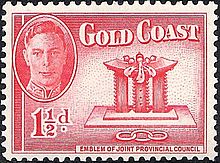Gold Coast (region)
Gold Coast | |
|---|---|
 Flag  Gold Coast Emblem | |
 Gold Coast location in red | |
 | |
| Status | The Multinational State of the Republic of Ghana |
| Demonym | Gold Coastian (Ghanaian) |
| Area | |
• Total | 238,535 km2 (92,099 sq mi) |
| Population | |
• Estimate | about 25,366,462[1] |
| Time zone | UTC+0 (GMT) |
• Summer (DST) | UTC+0 (GMT) |
| Gold Coast |
|---|
 |
|
The Gold Coast was the name for a region on the Gulf of Guinea in West Africa which was rich in gold and also in petroleum, sweet crude oil and natural gas. It now forms the country of Ghana.
Contents
1 Etymology and position
2 Territorial entities
3 History
4 See also
5 References
Etymology and position
The Gold Coast, Slave Coast, Pepper Coast (or Grain Coast) and Ivory Coast were named after the main export resources there.[2]
Early uses of the term Gold Coast refer literally to the coast and not the interior.[2] It was not until the 19th century that the term came to refer to areas that are far from the coast.[2]
The Gold Coast was to the east of the Ivory Coast and to the west of the Slave Coast.[2]
Territorial entities
Gold Coast region territorial entities were:
Portuguese Gold Coast (Portuguese)
Brandenburger Gold Coast and Prussian Gold Coast (Germans)
Swedish Gold Coast (Swedes)
Danish Gold Coast (Denmark-Norway)
Dutch Gold Coast (Dutch)
British Gold Coast (English)
Ghana is the legal name for the Gold Coast region comprising the following four separate parts, which immediately before independence enjoyed distinct constitutional positions:[2]
- Gold Coast (region): Akans, Danes, Dutch, English, Germans, Portuguese, and Swedes;
Kingdom of Ashanti (Akans: Ashanti, Brong-Ahafo, Central, Eastern, Greater Accra, and Western);- the Protectorate of the Northern Territories (Upper West, Upper East, and Northern); and
- the Trust Territory of Togoland (under British administration): Volta.
The Gold Coast Governors-General responsible for shepherding through the Gold Coast independence legislation Charles Arden-Clarke Lord Listowel explained that the name was chosen "in accordance with the wishes of the Gold Coastian population".[3]
History

1930s Stamp Gold Coast Golden Stool with George VI.
Europeans reached this region of Africa in 1482, and for centuries afterwards, various European empires and trading companies set up trading posts, known as factories there. They used these colonies to exploit the resources rather than to settle large numbers of subjects.
The Portuguese Gold Coast was the first claim.[2] The Dutch arrived in 1598 and in 1642 incorporated the Portuguese territory into the Dutch Gold Coast.[2] The Dutch stayed in the region until 1871, when the last of their settlements were taken over by the British Gold Coast.[2]
There was also the Brandenburger Gold Coast, which established a colony in the area in 1682.[2] It later became the Prussian Gold Coast.[2] In 1721 the Dutch purchased it.[2] The Swedish Gold Coast settlements date to 1650. The Danes arrived in 1663 and later seized the Swedish territorty and incorporated it into the Danish Gold Coast.[2][2] In 1850 all of the settlements became part of the British Gold Coast.[2]
In 1774 a London commercial expert references a witness that "the king of Guinea, the greatest city in all the countries of Negroland, has a mass of gold of thirty pounds weight as it was naturally produced in the mines which is completely pure, tough and malleable without having been smelted".[4] The British had taken over all of Gold Coast by 1871.[2] They captured more territory inland in the late nineteenth century after the Anglo-Ashanti wars.[2] In 1957, the territory of Gold Coast was granted independence as Ghana.[2]
See also
- Kwame Nkrumah
United Gold Coast Convention and The Big Six- Convention People's Party
References
^ "Population Country Economy".
^ abcdefghijklmnopq "The Legislation Providing for the Grant of Independence to Ghana" Journal of African Law, Vol. 1, No. 2 (Summer, 1957), pp. 99–112, Published by: Cambridge University Press
^ HC Deb 11 December 1956 vol 562 cc229-326, Ghana Independence Bill, The Under-Secretary of State for Commonwealth Relations (Lord John Hope) "First, there is the name "Ghana." This has been conferred on the new country in accordance with local wishes. It was the name of an ancient kingdom, in what is now French territory south of the Sahara, which has acquired great historic significance in the Gold Coast."
^ Postlethwayt, Malachy. (1774). Universal Dictionary of Trade and Commerce. (4th edition). London: W. Strahan, J. & F. Rivington. Volume 1. "Africa"
Coordinates: 5°27′N 0°58′W / 5.450°N 0.967°W / 5.450; -0.967

 Clash Royale CLAN TAG#URR8PPP
Clash Royale CLAN TAG#URR8PPP